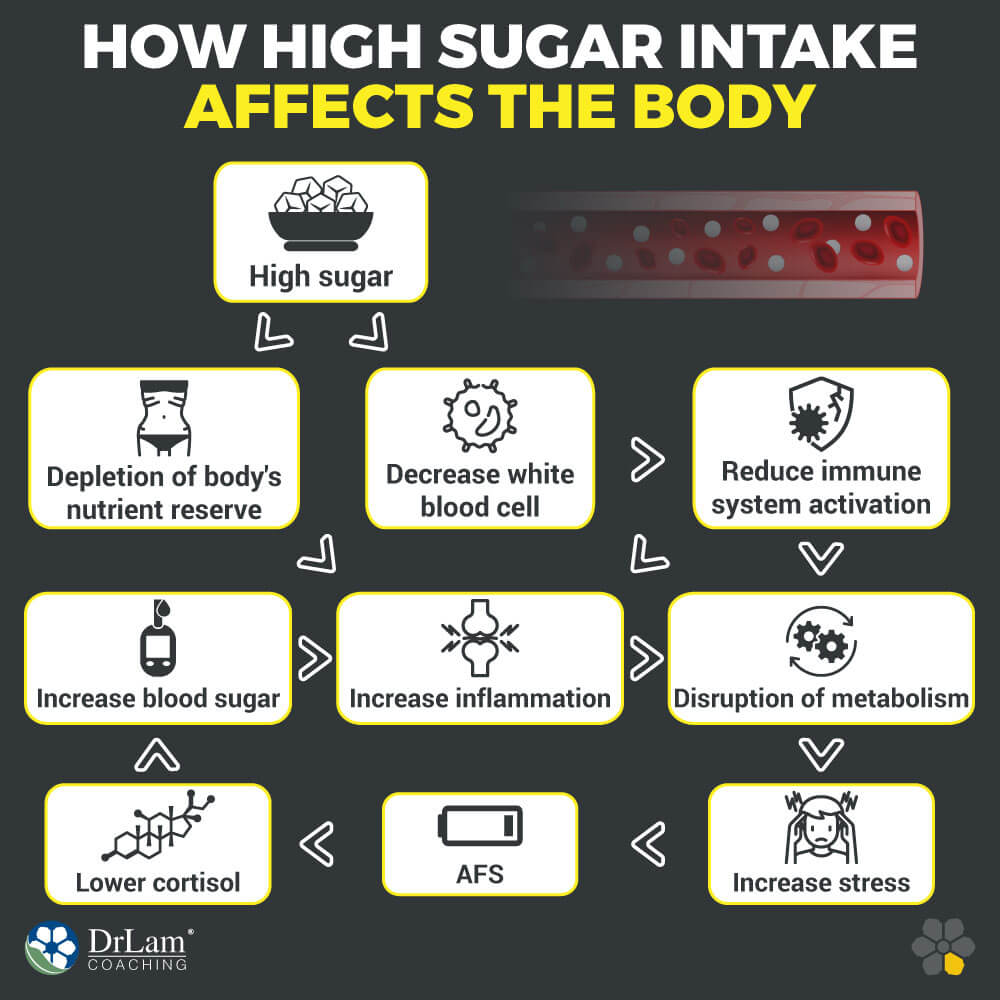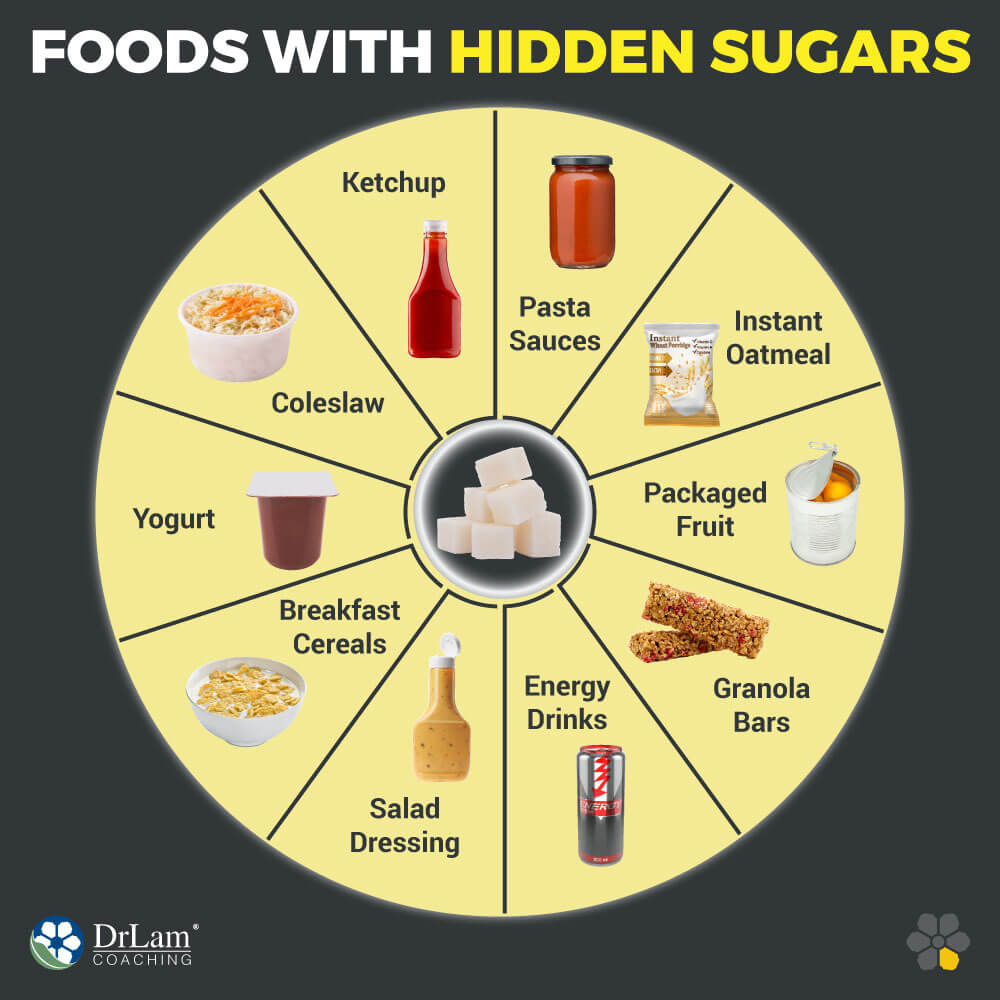Sugar cravings are rampant today. Many people reach for some type of sugary snack when they feel their energy lagging. Others turn to sugary snacks as comfort food. But sugar has a major impact on your health in ways you may not expect. Along with leading to problems like insulin resistance and obesity, sugar and immune health also become important, especially during a pandemic.
Your immune system responds to many factors including exercise, sleep, diet, stress, air pollution, and relationships. Research shows the types of foods you eat make quite an impact on the immune system. Diets high in vegetables, fruits, and good fats improve immune function. On the other hand, diets high in refined carbs tend to weaken immune function. To stay healthy, here's what you need to know about sugar and immune health.

Research indicates the relationship between sugar and immune health is complicated. In general, consuming significant amounts of sugar leads to the depletion of your body’s nutrient reserves. This, in turn, leads to a torrent of increased inflammation and disruption of metabolism.
When you already suffer from adrenal fatigue, this causes further stress on your body and thus increases the severity of Adrenal Fatigue Syndrome (AFS) symptoms. With AFS your adrenal glands already struggle to produce enough cortisol to fight stress. When these glands become fatigued, insufficient amounts of cortisol enter your body. With decreasing levels of cortisol, blood sugar levels tend to rise. Inflammation levels rise as well.
Under stress, your immune system becomes activated because of the increased inflammation and your pancreas reacts to the metabolic response.
Research into sugar and immune health also shows consuming diets that contain high-fat and high-sugar leads to changes in the microbiota in the microbiome. This, in turn, can lead to loss of diversity in the microbiome and changes in inflammatory markers.
High-fat and high-sugar diets also bring about changes in the circadian rhythm. Circadian changes then bring on more permeability in the intestinal lining, i.e. leaky gut, along with a decrease in the diversity of the microbiome.
It doesn’t take long to consume enough sugar to make these significant changes in the immune system. Research shows only 75 to 100 grams of sugar can bring on these changes. You can consume 75 grams of sugar by drinking only two cans of regular soft drinks.
The suppression of the immune system brought on by this level of sugar takes effect in only about 30 minutes. But it can last for up to five hours.
Your body uses certain cells to fight off viruses and other infections. Scientists studying sugar and immune health indicate the consumption of sugar significantly decreases your white blood cells’ ability to fight off viruses and protect you from infections.
Other cells, called phagocytes, work to consume bacteria and foreign particles in your body. Five main types of phagocytes exist in your body.
Research indicates that in no more than one to three hours after consumption of simple carbohydrates, the ability of these phagocytes to perform their immune functions becomes impaired. And this impairment can last for five hours. However, fasting for 36 to 60 hours significantly increased phagocytic functioning. Long-term fasting is not feasible or safe for many people, however, and it is not a good way to reverse the effects of sugar and immune health.
 Consuming excessive amounts of sugar stimulates your body to make increasing amounts of insulin and cortisol. These high levels of insulin and cortisol can be detrimental to your body systems. For example, long-term consumption of sugar can lead to lower levels of neurotransmitters and hormones.
Consuming excessive amounts of sugar stimulates your body to make increasing amounts of insulin and cortisol. These high levels of insulin and cortisol can be detrimental to your body systems. For example, long-term consumption of sugar can lead to lower levels of neurotransmitters and hormones.
Because of this connection, one way to help relieve AFS symptoms involves decreasing your intake of sugar and artificial sweeteners. Beware of hidden sugars, however. Sugar is often present in products you may not consider, as we will discuss later in this article.
A major difficulty encountered in AFS concerns hypoglycemia, or low blood sugar. Your blood sugar levels can become seriously low when under stress. This can become another source of stress, exacerbating your AFS symptoms.
A drop in energy typically comes with stress and low blood sugar. This often causes us to reach for some kind of sugary snack or drink to quickly increase energy. This can work for an hour or so, but then the hypoglycemia returns, sometimes worse than before.
On the other hand, if you eat a healthy snack when your energy level plummets, you’ll get a longer-lasting boost of energy. This eliminates the significant ups and downs that come with sugary snacks. Those ups and downs in blood glucose levels add to your overall stress, worsen AFS symptoms, and add stress to your pancreas, adrenals, and heart.

Many times, even when you religiously cut out simple carbohydrates and excess sugar, you still consume more than you know. These hidden sugars crop up in very unlikely places. Some examples follow.
Yes, these sauces don’t normally taste sweet, but they can contain 6 to 12 grams of sugar in a half-cup serving. This makes it imperative for you to check the ingredient labels on your pasta sauces to see how much hidden sugar mat be lurking there.
Touted as healthy snacks, these bars may contain brown sugar, corn syrup, dextrose, fructose, brown sugar syrup, or honey. When you add in any frosting, you can wind up with 8-12 grams of sugar in a tiny bar.
These foods contain lots of calcium and protein, but also lots of sugar. The flavored type of yogurt can contain 17-33 grams of sugar in an 8-ounce serving. A better option is to buy plain yogurt and add your favorite fruits.
Certainly, oatmeal contains a lot of fiber. However, the fruit-flavored instant kinds of oatmeal also contain 10-15 grams of sugar per packet. Those varieties labeled as reduced sugar still contain 5-6 grams of sugar. A more healthy option: Buy plain instant oatmeal and add apple slices. This gives you only about 1 gram of sugar.
The sweet types of salad dressing such as Catalina, French, and raspberry vinaigrette, for example, contain the most sugar. Up to 5-7 grams in two tablespoons. Another option is a light homemade vinegar and oil dressing with about one gram of sugar in two tablespoons.
Certainly, the cereals aimed at kids contain loads of sugar, but even those considered more healthy may load on the sugar as well. Several of the oat, bran, and corn cereals contain as much as 10-20 grams of sugar in one cup. Read the label to make sure of what you’re getting.
Most of these drinks include up to 25 grams of sugar in an 8-ounce serving. Since dehydration can make you feel tired, drink a glass of cool water instead of these.
Just one example: Packaged mandarin oranges in juice can contain 39 grams of sugar in one cup. If you drain the juice off, this reduces the sugar content to about 15.5 grams. Instead, just eat fresh fruit.
Even this more healthy side dish in restaurants can contain 15 grams of sugar. Better to make your own low-sugar version at home.
Ketchup contains up to about 4 grams per tablespoon. If you switch to yellow mustard instead, you’ll get less than one gram per tablespoon.
Since the relationship between sugar and immune health appears so fraught with health problems, what about switching to alternative or artificial sweeteners? There are health concerns with these as well.
Fructose often is found in processed foods. Currently, it accounts for about 10% of calories consumed in the U.S. Your colon breaks down small amounts of fructose. But the problem occurs when large amounts enter your body. Only a little over half a can of soda contains enough fructose to damage your liver.
The protein GLUT5, possibly a genetic factor, plays a major role in how well you can tolerate fructose. Too much fructose can cause bowel discomfort, bloating, and abdominal pain.
High Fructose Corn Syrup, HFCS, can cause heart hypertrophy, anemia, and high cholesterol in male laboratory rats. In female rats, it can cause infertility.
Many artificial sweeteners, on the other hand, can bring about changes in gut microbiota and can lead to glucose intolerance.

Several natural sugars can take the place of simple sugars and artificial sweeteners. No relationship appears to exist between natural sugar and immune health. Some of these natural sugars follow.
The leaves of stevia taste up to 300 times sweeter than sugar, so only a little goes a long way. It contains zero calories and does not impact blood sugar levels. You should get only 100% pure stevia in powdered leaf or liquid extract.
A sub-tropical melon, monk fruit contains zero calories and can be used as a 1:1 replacement for sugar. The sweetness comes from natural antioxidants in the fruit.
Although a tablespoon contains 17 grams of sugar, you can use honey as a sugar substitute if you use it sparingly. Darker raw honey contains significant amounts of antioxidants, vitamins, minerals, and amino acids. It contains anti-inflammatory and antibacterial properties and can lower blood pressure and cholesterol.
Make certain the maple syrup you buy is real maple syrup and not ‘maple-flavored syrup’ or ‘pancake syrup’. These typically contain high fructose corn syrup in disguise. Genuine maple syrup can substitute for sugar in nearly any recipe. It contains B vitamins, vitamin C, iron, potassium, and calcium in large amounts.
High in nutrients, including selenium, calcium, and iron, blackstrap molasses digests slower than other sugars, thus keeping blood sugar levels stable. Be aware of its strong flavor when substituting in recipes though.
A raw food, coconut sugar contains vitamins, minerals, and electrolytes to keep your body’s fluid levels balanced. It also contains inulin, a prebiotic fiber to help stabilize blood sugar and feed good gut bacteria.
Found naturally in a few foods like wheat, raisins, and figs, allulose is a ‘rare sugar’. It tastes similar to sugar but has far fewer calories and zero carbs since it is indigestible. It does not raise blood glucose or insulin levels.
The relationship between sugar and immune health is complex. Overall, sugar lowers your immune functioning, lowers insulin resistance, and worsens fatigue and stress on your body.
For those with AFS, consuming too much simple sugar can make symptoms worse. It can lead to an increased likelihood of leaky gut, lower levels of neurotransmitters and hormones, and becomes one more stressor on your body. Increased sugar intake stimulates increased cortisol production which already borders on insufficient due to adrenal fatigue. Thus, your adrenals become more overburdened by this pressure, and cortisol production lessens. Lowered cortisol leads to increased glucose.
 If you are concerned about your intake of sugar and immune health, here are some things you can do to alleviate the situation:
If you are concerned about your intake of sugar and immune health, here are some things you can do to alleviate the situation:
If you do try new foods or significantly change your diet, it's a good idea to do so with the guidance of your healthcare practitioner. Those with major health conditions like diabetes or AFS should be especially careful, due to the danger of blood sugar spikes and crashes and food sensitivities.
If you would like to know more about or need assistance with decisions related to sugar and immune health, the team at Dr. Lam Coaching can help. We offer a free** no-obligation phone consultation at +1-626-571-1234 where we will privately discuss your symptoms and various options. You can also send us a question through our Ask The Doctor system by clicking here.
Sugar and immune health are related in complex ways. Too much simple sugar in your diet leads to sugar spikes and impaired immune functioning. Artificial sweeteners are dangerous to your health in many other ways. Fortunately, there are several natural sweeteners that can be substituted for sugar in most applications.
